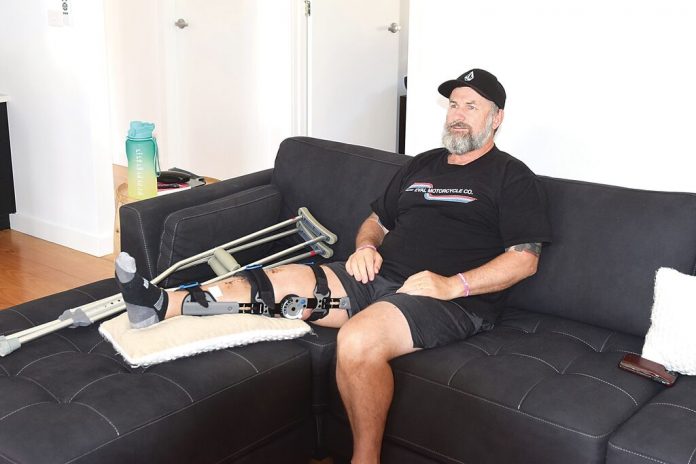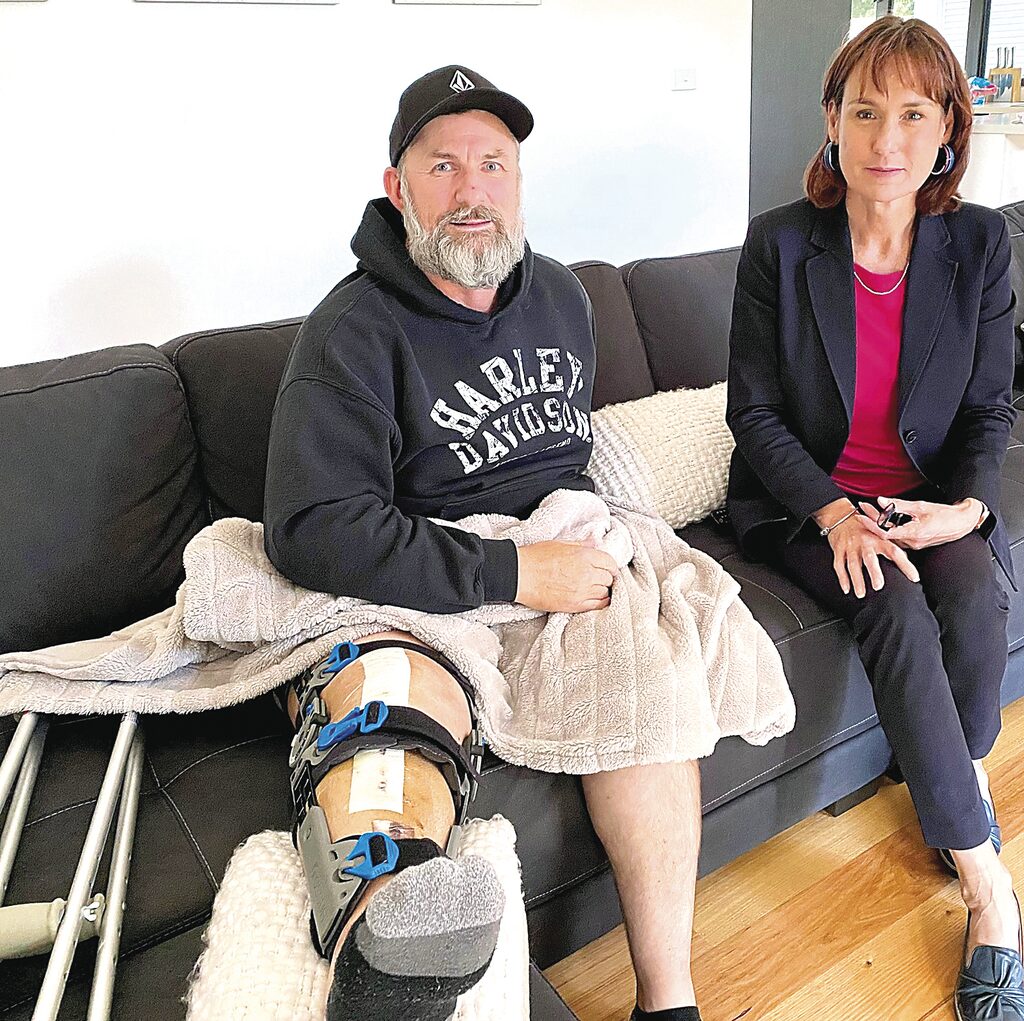
TOM HAYES
By TOM HAYES
HOW do you know when to make an emergency call to 000? That is the question that Russell and Janine Croydon were left asking, after the Emergency Services Telecommunications Authority’s (ESTA) failure to send an ambulance to them last month. When returning home from a bike ride, Mr Croydon broke his leg in an accident that left him stranded in the middle of the road. Due to the evident pain and discomfort he was in, his wife called 000, in hopes to get professional help to take him to Latrobe Regional Hospital. But ESTA refused to deploy an ambulance; instead, ESTA instructed Mrs Croydon not to move Mr Croydon and wait for a call from a paramedic or nurse within the hour. “What do I do?” was Mrs Croydon’s first thought. “Thankfully we had friends there (to help).” She found this to be quite strange, but time was of the essence as she took matters into her own hands to get her husband to the hospital, as her head scrambled with ideas. Passers-by helped Mrs Croydon put her husband in the car, stabilising his leg, before she swiftly took him to the hospital herself. Once arriving at the hospital, Mr Croydon was in the hands of nurses within 15 minutes and was given pain-killers immediately. “There was relief for me, and definitely (Mr Croydon) getting some pain relief,” Mrs Croydon said. “I hope that (ESTA) change their rules. “If (ESTA is) going to say people have to get themselves to hospital with a broken leg, give us some guidance on what we need to do.” The ESTA receive calls from the community, not the paramedics on standby. Mrs Croydon paid a visit to the Traralgon Ambulance Station days after the incident, asking paramedics if her situation was viable enough for an ambulance to deployed; she was told they would have attended. Mr Croydon underwent two surgeries to repair his broken leg, which required metal pins and rods. His first surgery was two-and-a-half days after he arrived, as they couldn’t operate immediately due to swelling. Mr Croydon was put under the knife again four days later to complete the procedure, after being bumped back four times due to elective surgeries. Now out of hospital for over a month, Mr Croydon is relieved that the process is over, yet worries for others who may find themselves in a similar situation. Mr Croydon will be out of action for six to 12 weeks, potentially missing out on work, up until April this year. Member for Eastern Victoria, Melina Bath, visited the couple and discussed the potential for this incident to be dug deeper. “When people come in the front door and start saying that they’ve got an issue with the state government, then it’s certainly my role to investigate it,” Ms Bath said. “It highlighted that community expectations on a 000 service, is not being met,” Ms Bath said upon speaking to Mr and Mrs Croydon. Ms Bath mentioned that the advice given to the community outlines that a 000 call is justifiable if someone suffers an unplanned fall. “(Mr and Mrs Croydon are) not medical professionals and so when you see something of that nature … then the expectation would have been that the service would say ‘we will put you in line and an ambulance will be dispatched’,” Ms Bath continued. “In listening to the Croydons … they’re saying to me through their experience and other people reaching out to them that ‘it’s not an isolated incident’.” “The community feels that the only way they can get an ambulance dispatched promptly is by creating commentary. “Our paramedics do an outstanding job, so this is not a challenge on their professionalism, it’s the system to dispatch the paramedics.” Ms Bath stresses the importance to distinguish the separate entities between paramedics waiting on standby and ESTA. When Mr Croydon was admitted to hospital, he met another man who endured a similar situation. This individual was on a rural farm and also broke his leg. According to Mr and Mrs Croydon, he told them he had to say he had chest pains in order to have an ambulance dispatched. “It’s not about me … we want it to be about people (needing) to know when you ring 000, you aren’t going to get an (ambulance) unless you tell porky pies,” Mr Croydon said. Mr and Mrs Croydon told The Express that they recalled another patient, who was 78-years-old and was refused an ambulance, after he fell in his home and was found later to be bleeding. It took until his daughter called, that emergency services arrived for the man and his wife, who were suffering from gastro side-effects. Last week on Tuesday, December 20, Ms Bath took this incident to parliament alongside other ongoing issues from the Latrobe Valley. At parliament, an adjournment debate was held, enabling Ms Bath to put her questions. The Minister of Emergency Services, Jaclyn Symes, who was present, responded directly to Ms Bath. “I think the government needs to properly resource the system so that people like the Croydons can feel that there would be an ambulance dispatched,” Ms Bath said. “I understand that there is a system, but I don’t think community expectations have been met in this case. “Clearly someone’s lying in the middle of the road with a compound-fractured leg, told not to move, not sure what other injuries there are, waiting for up to an hour to have someone ring back is not reasonable.” Following the adjournment debate, Ms Symes was asked to personally write to the Croydons and explain how the system can be improved, to cater for an incident like theirs. Ms Symes explained the extensive process that ESTA callers go through when receiving a 000 call. “So a code one is cardiac emergency, lights and sirens, ambulance always dispatched,” Ms Symes said. “When it comes down more to injuries and things that are not life-threatening – although I acknowledge the pain and suffering that your constituents obviously were under – it comes back to a decision that is made from a very precise script and a very precise set of criteria that the call-taker would put into a system. “Then it goes to a clinical expert, such as a paramedic or a nurse, who returns the call, and the callers every single time – because I listened every time there – are told to call back if the condition gets any worse or if they see any deterioration in the condition.” While nothing was immediately resolved, Ms Bath said she would continue to advocate for Eastern Victorians, especially for issues like this.












